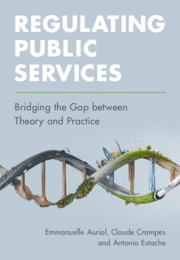Book contents
- Reviews
- Regulating Public Services
- Regulating Public Services
- Copyright page
- Contents
- Figures
- Tables
- Boxes
- Foreword
- Preface
- Acknowledgements
- Symbols
- Abbreviations
- 1 Introduction
- 2 Defining a Theoretical Normative Benchmark
- 3 Thinking Like a Monopoly about Price and Output
- 4 Regulating a Monopoly with Full Information
- 5 Regulating under Informational Constraints
- 6 Regulatory Rules to Set the Average Price
- 7 Linking Regulatory Theory to Practice through Finance
- 8 Non-Linear Pricing in Regulation
- 9 Social Concerns in Regulatory Design
- 10 Regulating Quality
- 11 On the Regulation of Investment
- 12 Regulating Multi-Product Oligopolies
- 13 Abuse of Market Power in (De)Regulated Industries
- 14 On the Relevance of Institutional Quality
- 15 Emerging Regulatory Challenges
- Bibliography
- Index
4 - Regulating a Monopoly with Full Information
Published online by Cambridge University Press: 27 January 2022
- Reviews
- Regulating Public Services
- Regulating Public Services
- Copyright page
- Contents
- Figures
- Tables
- Boxes
- Foreword
- Preface
- Acknowledgements
- Symbols
- Abbreviations
- 1 Introduction
- 2 Defining a Theoretical Normative Benchmark
- 3 Thinking Like a Monopoly about Price and Output
- 4 Regulating a Monopoly with Full Information
- 5 Regulating under Informational Constraints
- 6 Regulatory Rules to Set the Average Price
- 7 Linking Regulatory Theory to Practice through Finance
- 8 Non-Linear Pricing in Regulation
- 9 Social Concerns in Regulatory Design
- 10 Regulating Quality
- 11 On the Regulation of Investment
- 12 Regulating Multi-Product Oligopolies
- 13 Abuse of Market Power in (De)Regulated Industries
- 14 On the Relevance of Institutional Quality
- 15 Emerging Regulatory Challenges
- Bibliography
- Index
Summary
Modern regulation theory is anchored into two canonical models of regulation under the benchmark case of full information. Baron– Myerson (1982) is useful to analyse the optimal regulation of efficiently run private monopolies for which maximization of profit, and therefore cost control, is paramount, while Laffont– Tirole (1986) is useful to design the regulation of any type of monopoly for which institutional or management characteristics are just as important as technological ones. This typically includes SOEs in addition to private enterprises, since SOEs tend to be much more subject to political interference than their private alternatives. To alleviate this problem, many governments have created separate regulatory agencies but political interference largely persists. Optimal regulation also needs to consider the constraints on the fiscal capacity of the sector. In countries with highly distorted tax systems, user fees may impose lower costs on society than subsidies. Combined with the need to recognize that without subsidies monopolies have to enjoy financial autonomy to be able to cover their costs and deliver the services, it leads to an upgraded Lerner index formula: Ramsey pricing. The optimal price level, when costs can be observed, depends on the elasticity of demand and on the opportunity cost of public funds.
Keywords
- Type
- Chapter
- Information
- Regulating Public ServicesBridging the Gap between Theory and Practice, pp. 80 - 102Publisher: Cambridge University PressPrint publication year: 2021



